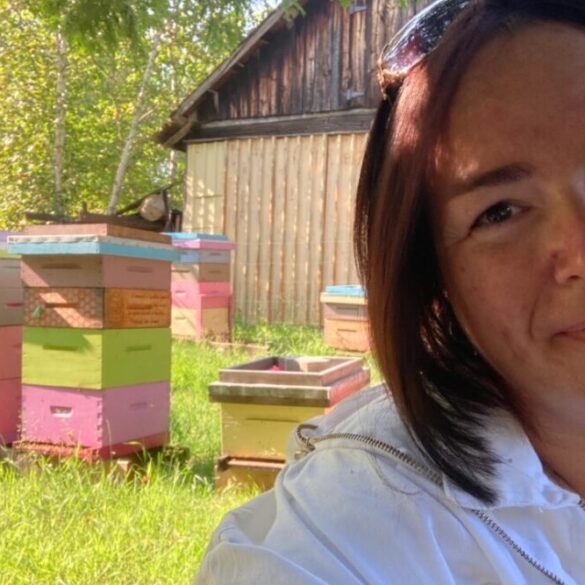
Dawn Lalonde of Mikkola Family Farm & Apiary in Lively, Ontario. She has been beekeeping on the same property for seven years, but now has lost over a million bees. (Photo courtesy of Dawn Lalonde)

A Sudbury-based beekeeper is asking questions after more than a million of her bees died suddenly.
Dawn Lalonde of Mikkola Family Farm & Apiary in Lively, Ontario, said her bee colonies have been in the same place for seven years, and she had been hoping to raise enough money to move to a new property and expand. After 1.2 million of her bees died on June 14, she doesn’t know how she’ll go on.
“I knew right away something wasn’t right,” she told The Epoch Times in a phone interview. She had visited her colonies to check on them but found the scene “apocalyptically eerie.”
She went to the colonies one by one. By the time she reached the third one, she knew there was a big problem.
“The number of bees in that colony from a couple weeks prior had dropped drastically,” Ms. Lalonde said. “There were signs of dead bees outside the colony.”
It’s been a distressing experience for her, she said. The colonies had been inspected and deemed healthy just weeks before the mass deaths.
“There’s an emotional tie to them. It’s our livestock,” she said. “It’s no different than somebody raising chickens or cattle and they birth a baby calf.”
It’s also taken a financial toll on her and her business, which she had been hoping to expand.
“I needed this crop to be able to relocate my business,” she said.
Now she doesn’t know how she’ll make up for the loss of bees, equipment, and honey sales.
“I’m a single woman and this was my business.”
Chemical Concerns
Ms. Lalonde said she is determined to find out what caused the death of her bees, suggesting it could be from a chemical sprayed in the area.
She’ll have to pay the lab costs to find out, something that led her to start a GoFundMe campaign that has raised more than $10,000 to pay for tests.
“The testing is not cheap,” she said. “There are over 30 different chemicals I’ll be testing for specifically to find an answer.” Each sample could cost $320.
She said some natural mosquito repellants attract honeybees, and when they get mixed with natural products that harm bees, like garlic, it becomes “a big risk.”
Whatever caused the death of her livestock, the answer may require government intervention, she said.
“We need to work together. And I think it’s time that we do that at all three levels of government.”
The Ontario Ministry of Agriculture, Food and Agribusiness said it could not comment on specific cases.
The province has a mortality reporting form where honeybee mortality incidents can be reported when there is a suspected environmental issue.
Ms. Lalonde said she is grateful for the community support.
“Quite a few beekeepers have stepped up and made donations,“ she said. Others came from members of the community who simply wanted to help her, she said. ”It’s been really overwhelming in that way.”
Started as a Hobby
Ms. Lalonde said she got into beekeeping after taking a class for fun about 10 years ago.
“It actually was supposed to be a hobby,“ she said. “It quickly went from a hobby to a business.”